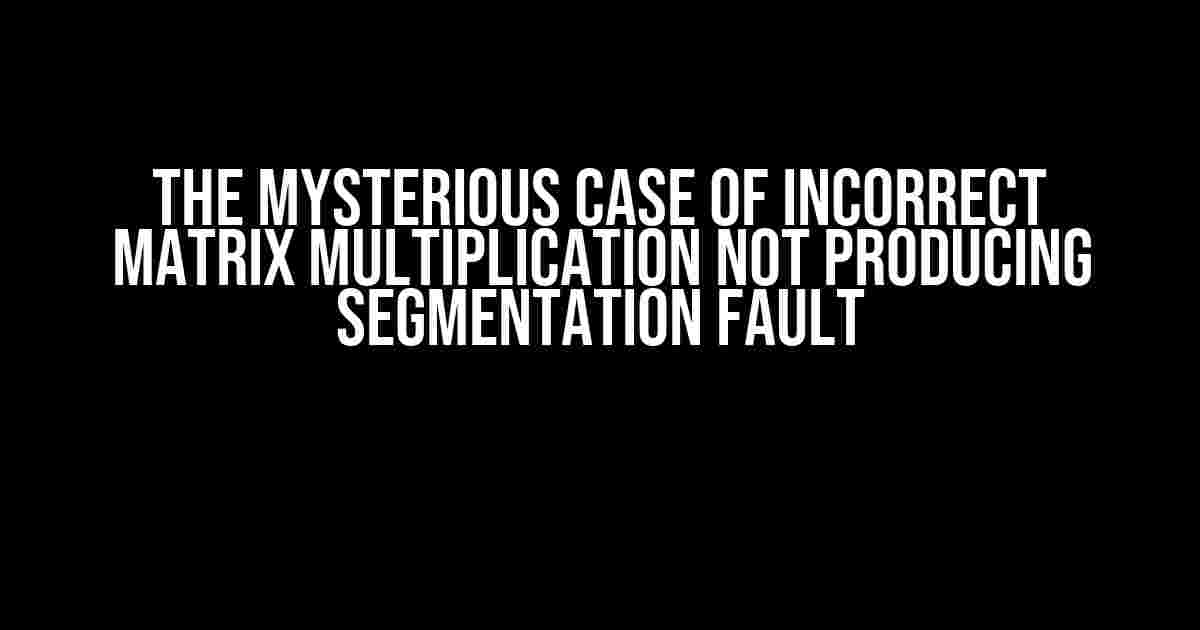Have you ever found yourself in a situation where you’re trying to multiply matrices, but your program refuses to give you the satisfaction of a segmentation fault? Well, you’re not alone! In this article, we’ll delve into the world of matrix multiplication, explore the reasons behind this phenomenon, and provide you with a step-by-step guide on how to troubleshoot and fix the issue.
Understanding Matrix Multiplication
Before we dive into the problem, let’s take a quick refresher on matrix multiplication. Matrix multiplication is a binary operation that takes two matrices as input and produces another matrix as output. The multiplication operation is only possible if the number of columns in the first matrix is equal to the number of rows in the second matrix.
A (m x n) | B (n x p) = C (m x p)
In the above example, matrix A has m rows and n columns, matrix B has n rows and p columns, and the resulting matrix C has m rows and p columns.
The Problem: Incorrect Matrix Multiplication Not Producing Segmentation Fault
Now, let’s say you’re trying to multiply two matrices, but your program doesn’t produce a segmentation fault even when the multiplication operation is incorrect. This can be frustrating, as you expect the program to crash and provide an error message, but instead, it runs silently, producing incorrect results.
So, what’s going on? Why isn’t your program producing a segmentation fault when you’re trying to multiply matrices with incompatible dimensions?
Reasons Behind the Issue
There are several reasons why your program might not be producing a segmentation fault when multiplying matrices incorrectly:
- Memory Allocation: When you allocate memory for your matrices, the compiler doesn’t check if the multiplication operation is valid. It only checks if the memory allocation is successful. As a result, even if you’re trying to multiply matrices with incompatible dimensions, the program won’t crash immediately.
- Lack of Error Checking: Many matrix multiplication algorithms don’t perform error checking on the input matrices. This means that even if the matrices have incompatible dimensions, the algorithm will still try to perform the multiplication operation, resulting in incorrect results.
- Compiler Optimizations: Modern compilers are optimized for performance, which means they might not always produce a segmentation fault even when the program is trying to access memory outside the allocated bounds.
How to Troubleshoot and Fix the Issue
To troubleshoot and fix the issue, follow these steps:
- Check the Matrix Dimensions: Before performing matrix multiplication, make sure to check the dimensions of the input matrices. Verify that the number of columns in the first matrix is equal to the number of rows in the second matrix.
- Implement Error Checking: Write error checking code to verify the input matrices before performing the multiplication operation. This can include checks for null pointers, matrix dimensions, and data types.
- Use Debugging Tools: Use debugging tools such as gdb or Valgrind to detect memory access errors and identify the location of the problem in your code.
- Review Your Matrix Multiplication Algorithm: Review your matrix multiplication algorithm to ensure it’s correct and efficient. Make sure to handle edge cases and boundary conditions properly.
- Use Standard Libraries: Consider using standard libraries such as BLAS or LAPACK, which provide optimized and error-checked matrix multiplication functions.
Example Code: Correct Matrix Multiplication with Error Checking
void matrix_multiply(float **A, float **B, float **C, int m, int n, int p) {
if (n != p) {
printf("Matrix dimensions are incompatible for multiplication.");
return;
}
for (int i = 0; i < m; i++) {
for (int j = 0; j < p; j++) {
C[i][j] = 0;
for (int k = 0; k < n; k++) {
C[i][j] += A[i][k] * B[k][j];
}
}
}
}
In the above example, we've added error checking to verify that the matrix dimensions are compatible for multiplication. If the dimensions are incompatible, the function returns an error message and exits.
Conclusion
Incorrect matrix multiplication not producing a segmentation fault can be a frustrating issue, but by understanding the reasons behind the problem and following the troubleshooting steps outlined in this article, you can identify and fix the issue in your code. Remember to always check the matrix dimensions, implement error checking, and use debugging tools to detect memory access errors. With these best practices, you'll be well on your way to writing robust and efficient matrix multiplication algorithms.
| Matrix Dimensions | Correct Multiplication | Incorrect Multiplication |
|---|---|---|
| m x n | n x p | p x n |
| m x n | n x p | n x m |
| m x n | n x p | p x q |
The above table illustrates the correct and incorrect matrix dimensions for multiplication. Remember to always check the matrix dimensions before performing the multiplication operation.
By following the guidelines and best practices outlined in this article, you'll be able to troubleshoot and fix the issue of incorrect matrix multiplication not producing a segmentation fault, ensuring that your programs are robust, efficient, and reliable.
Frequently Asked Question
Matrix multiplication got you down? Don't worry, we've got the answers to your most pressing questions about why incorrect matrix multiplication isn't producing a segmentation fault!
Why isn't my program crashing when I multiply two matrices with different dimensions?
That's because C/C++ doesn't perform bounds checking on arrays, so it won't stop you from accessing memory outside the bounds of the array. Instead, it will result in undefined behavior, which might not always cause a segmentation fault.
What happens when I try to multiply two matrices with incompatible dimensions?
When you multiply two matrices with incompatible dimensions, the operation will simply ignore the mismatch and perform the multiplication as if the matrices were compatible. This can lead to unexpected results and potential errors in your program.
Is there a way to catch matrix multiplication errors at compile-time?
While C/C++ can't catch these errors at compile-time, you can use template metaprogramming in C++ to create a matrix class that performs dimension checks at compile-time. This can help prevent errors before your program even runs.
How can I ensure that my matrix multiplication is correct and safe?
To ensure safe and correct matrix multiplication, always check the dimensions of the matrices before performing the operation. You can also use libraries like Eigen or Armadillo, which provide built-in dimension checking and matrix multiplication functions.
What's the difference between a segmentation fault and undefined behavior?
A segmentation fault occurs when your program attempts to access memory that it's not allowed to access. Undefined behavior, on the other hand, occurs when your program performs an operation that's not defined by the language standard, such as multiplying matrices with incompatible dimensions. Undefined behavior can sometimes lead to a segmentation fault, but not always.


